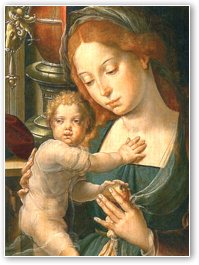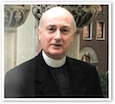Moral Memory and the Church
- FATHER GEORGE W. RUTLER
The Church has a long memory. One might well say that she "is" memory.
 She is in fact the memory of the human race. In her nascent form in the history of Israel, she was already recollecting the human drama: "I will remember the deeds of the Lord" (Psalm 77:11). As Christ is the Beginning and End of all things, he can call to mind events and circumstances from before recorded history. The Pharisees knew the history of the Mosaic Law, but only Christ knew what life was like from the beginning (cf. Matt. 19:8).
She is in fact the memory of the human race. In her nascent form in the history of Israel, she was already recollecting the human drama: "I will remember the deeds of the Lord" (Psalm 77:11). As Christ is the Beginning and End of all things, he can call to mind events and circumstances from before recorded history. The Pharisees knew the history of the Mosaic Law, but only Christ knew what life was like from the beginning (cf. Matt. 19:8).
While philosophers animate and amplify the cultural memory, Christ is the source of the truth that philosophy seeks. This is why Christ is not a philosopher and can only be understood as the ultimate object of philosophy, the eternal Wisdom, Logos, which shaped the logical order of the universe. "He is before all things, and in him all things hold together" (Col.1:17). So Saint Paul told the stately philosophers in Athens that Christ is the mysterious "unknown god" who replaced their questions marks with an exclamation point.
As the memory is part of the soul, tyrants dehumanize people by manipulating their memory. They describe heroes as villains and villains as heroes, and erase events that are inconvenient to their narrative of the world.
This also happens in the private conscience. People try to forget the truth when they want to lie. But since lies contradict the way things are, liars have to fabricate a false history. So it is that liars need a good memory. They have to remember what they have denied. This is the protocol of all moral confusion.
A common way to lie is to change words. Euphemisms are verbal gymnastics to avoid the truth. For instance, vice can be made to sound attractive by calling it liberating. Or, as Stalin said, "One death is a tragedy; one million is a statistic." A recent headline on the front page of the New York Post told of a criminal horror: "Baby Ripped from Womb." The subtitle said: "Bronx Mom Slain for Fetus." Now, a baby is a fetus, and a fetus is a baby, but why not just call it a baby? It is hard to extricate oneself from euphemisms. As Sir Walter Scott wrote: "Oh what a tangled web we weave, when first we practice to deceive!"
Advent awakens the moral memory to the most important facts of the human condition: Death, Judgment, Heaven and Hell. These truths can be erased from memory by ignoring Advent altogether and celebrating Christmas early with little understanding of it. But then we would cease to be Christians entrusted with the memory of the human race. "I have said these things to you, that when the hour comes, you may remember that I told them to you" (John 16:4).
 This is Meaghen Gonzalez, Editor of CERC. I hope you appreciated this piece. We curate these articles especially for believers like you.
This is Meaghen Gonzalez, Editor of CERC. I hope you appreciated this piece. We curate these articles especially for believers like you.
Please show your appreciation by making a $3 donation. CERC is entirely reader supported.

Acknowledgement
 Father George W. Rutler. "Moral memory and the Church." From the Pastor (November 29, 2015).
Father George W. Rutler. "Moral memory and the Church." From the Pastor (November 29, 2015).
Reprinted with permission of Father George W. Rutler.
The Author
 Father George W. Rutler is the pastor of St. Michael's church in New York City. He has written many books, including: The Wit and Wisdom of Father George Rutler, The Stories of Hymns, Hints of Heaven: The Parables of Christ and What They Mean for You, Principalities and Powers: Spiritual Combat 1942-1943, Cloud of Witnesses — Dead People I Knew When They Were Alive, Coincidentally: Unserious Reflections on Trivial Connections, A Crisis of Saints: Essays on People and Principles, Brightest and Best, and Adam Danced: The Cross and the Seven Deadly Sins.
Father George W. Rutler is the pastor of St. Michael's church in New York City. He has written many books, including: The Wit and Wisdom of Father George Rutler, The Stories of Hymns, Hints of Heaven: The Parables of Christ and What They Mean for You, Principalities and Powers: Spiritual Combat 1942-1943, Cloud of Witnesses — Dead People I Knew When They Were Alive, Coincidentally: Unserious Reflections on Trivial Connections, A Crisis of Saints: Essays on People and Principles, Brightest and Best, and Adam Danced: The Cross and the Seven Deadly Sins.




